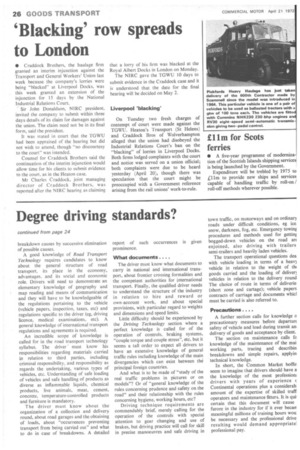'Blacking' row spreads to London
Page 28

If you've noticed an error in this article please click here to report it so we can fix it.
• Craddock Brothers, the haulage firm granted an interim injunction against the Transport and General Workers' Union last week because the company's lorries were being "blacked" at Liverpool Docks, was this week granted an extension of the injunction for 15 days by the National Industrial Relations Court.
/ Sir John Donaldson, NIRC president, invited the company to submit within three days details of its claim for damages against the union. The claim need not be in its final form, said the president.
It was stated in court that the TGWU had been appraised of the hearing but did not wish to attend, though "no discourtesy to the court" was intended.
Counsel for Craddock Brothers said the continuation of the interim injunction would allow time for his clients to submit evidence to the court, as in the Heaton case.
Mr Charles Craddock, joint managing director of Craddock Brothers, was reported after the NIRC hearing as claiming that a lorry of his firm was blacked at the Royal Albert Docks in London on Monday.
The NIRC gave the TGWU 10 days to submit evidence in the Craddock case and it is understood that the date for the final hearing will be decided on May 2.
Liverpool 'blacking'
On Tuesday two fresh charges of contempt of court were made against the TGWU. Heaton's Transport (St Helens) and Craddock Bros of Wolverhampton alleged that the union had disobeyed the Industrial Relations Court's ban on the "blacking" of lorries in Liverpool Docks. Both firms lodged complaints with the court and notice was served on a union official; both complaints were due to be heard yesterday (April 20), though there was speculation that the court might be preoccupied with a Government reference arising from the rail unions' work-to-rule.












































































































